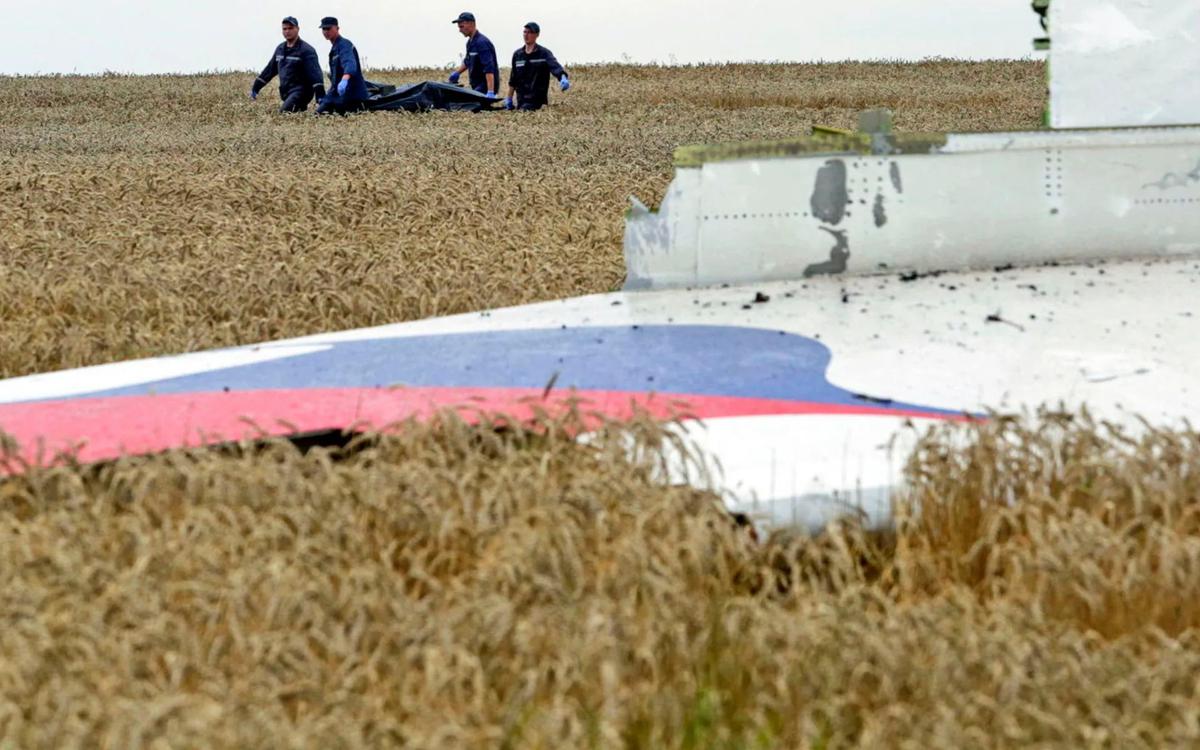This Week’s Highlights
Russia ditches any further MH17 communication with the Netherlands and Australia — what does it mean for those seeking justice for the victims and their families; we explain additional symbolism behind the new round of EU sanctions against Russia; plus, Russian-annexed Crimea is facing a humanitarian disaster due to ongoing climate catastrophe.
Want to get the full story? Click the links below for full-length articles in Russian.
Russia Leaves MH17 Talks
The Kremlin abruptly ended any further discussions with the Netherlands and Australia over the MH17 investigation. Moscow insists the families of the victims and their governments 'are not interested' in figuring out what happened with the plane. But behind these statements is a calculated campaign by the Russian government to limit the publicity damage.
CAN'T FIGHT THE MOUNTING EVIDENCE ANYMORE.It has been six years since the downing of a Dutch passenger flight over war-torn Eastern Ukraine that killed 298 people on board. A Dutch-led investigative team gathered a substantial amount of evidence linking the missile that shot down the plane to a Russian missile launcher, which originated in Russia's army base not far from the border with Ukraine.
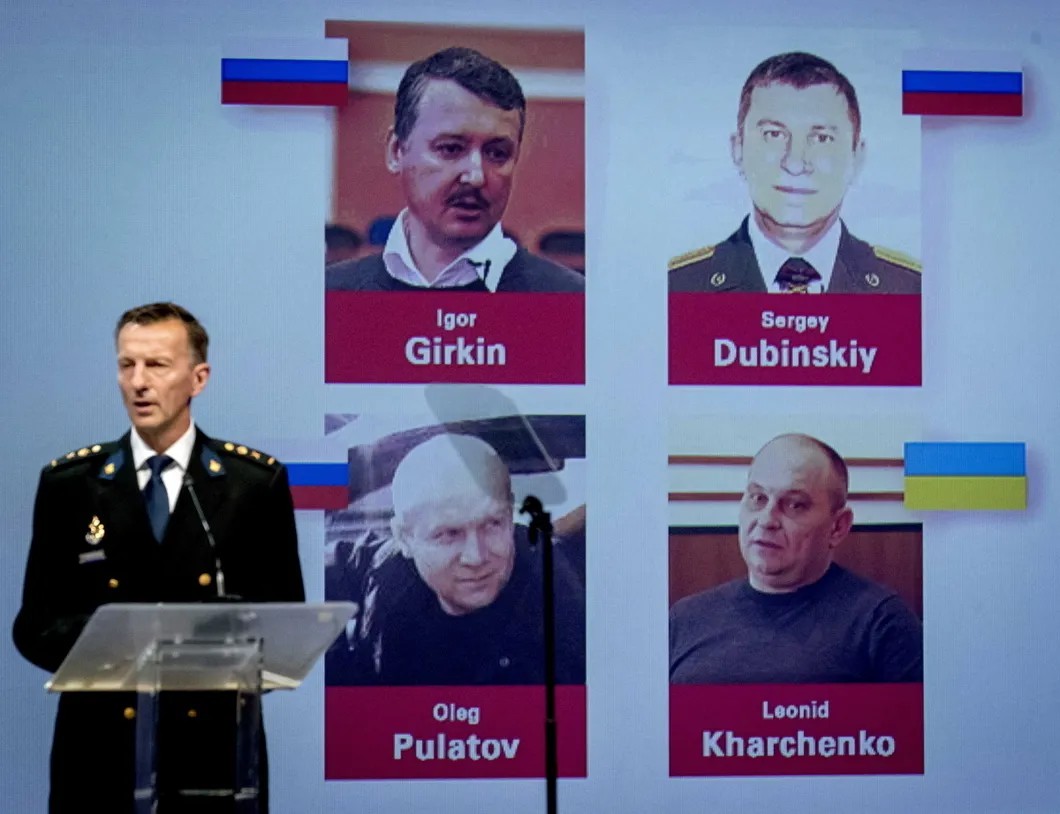
WHAT HAS TRIGGERED THE KREMLIN. Despite numerous denials from the Kremlin, in 2018, it agreed to start talks with the Netherlands and Australia (another country impacted by the crash) about possible compensation for the victims' families. The talks were a drag. So this summer, the Netherlands sued Russia in the European Court of Human Rights, strengthening the victims' families' case but roiling Moscow. Three months later, Russia halts the talks in response.
ZUGZWANG.Russia is in a difficult spot now. Either it admits the guilt by paying the victims' families or awaits the case's outcome in the European Court of Human Rights. But quite likely, it won't be in the Kremlin's favor, anyway. So what is happening is basically the Kremlin lawyering up to delay or avoid any formal recognition of its direct involvement in the MH17 attack.
'Not being able to influence the course of the investigation, Russia has throughout the years used any means possible to prevent the truth from coming out, throwing around false versions of events and discrediting the investigation with accusations of anti-Russian bias,' Vadim Lukashevich, an aviation expert and participant in the court proceedings, tells Novaya Gazeta.
BACKSTORY.Novaya Gazeta has been reporting on the tragedy since the beginning. Our journalists tracked down a colleague of the now-retired Russian Colonel allegedly responsible for delivering the missile that shot down MH17. We conducted our investigations into the rocket, interviewing Russian military engineers. We sent reporters to inspect the crash location and interviewed some of the victims' family members. We followed the various investigations into the crash. We wrote about the three Russian citizens blamed for the incident: Igor Strelkov (Girkin), Sergey Dubinsky (Khmury), Oleg Pulatov (Gyurza). Our correspondent also interviewed a veteran intelligence official who knew one of the people implicated in the tragedy.
Read Vadim Lukashevich’s full analysis of the timeline of Russia’s involvement in the MH17 investigations here.
New EU Sanctions, Explained
This week we learned the names of the Russian officials who the European Union sanctioned in response to the poisoning of opposition leader Alexei Navalny. Among those targeted are six high-level Kremlin officials, in addition to the agency responsible for developing the Novichok nerve agent. With these measures, the EU aims to send a strong message to the Kremlin: using chemical weapons will not be tolerated. Neither will assassination attempts against political rivals.
SIX INDIVIDUALS.The sanctions hit several high-level Kremlin officials, including Alexander Bortnikov, the Director of Russia's Federal Security Service (FSB), and Sergei Kiriyenko, the First Deputy Chief of Staff of Russia's Presidential Administration. The others are Andrei Yarin, head of the president's internal department (who the EU said was attempting to discredit Navalny), Sergei Menyailo, a presidential envoy to Siberia (where Navalny was poisoned), and Andrei Yarin and Alexei Krivoruchko, both of whom are deputy defense ministers.
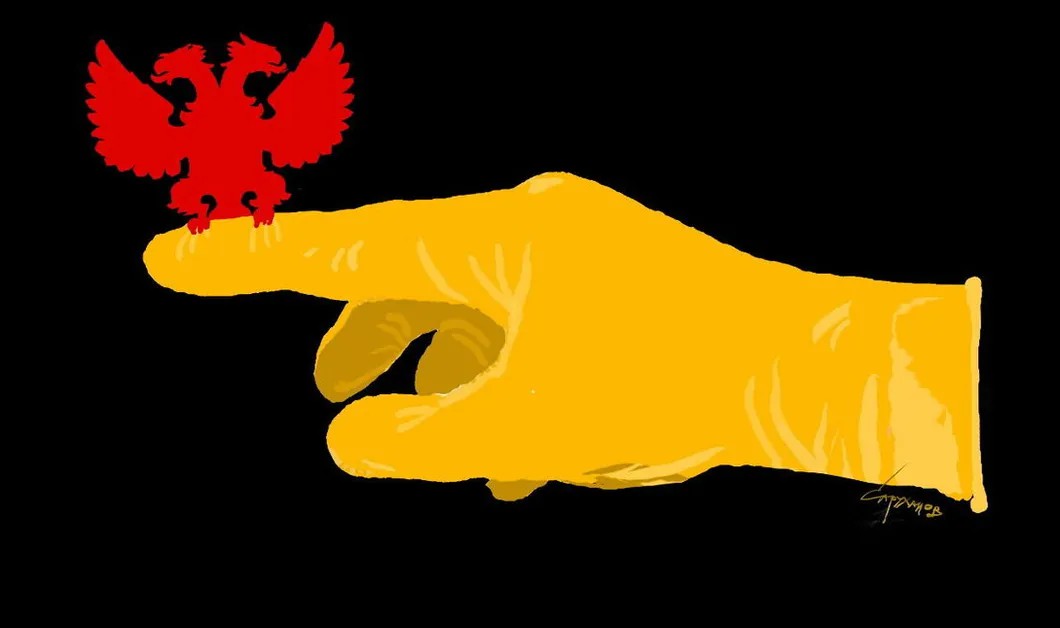
PLUS, ONE ENTITY.The EU also the State Scientific Research Institute for Organic Chemistry and Technology because it was supposed to have destroyed the Soviet-era chemical weapons used against Navalny. Before 1994, the institute developed and produced chemical weapons, including Novichok.
RATHER SYMBOLIC THAN EFFECTIVE.The sanctions are not in response to the poisoning of an opposition leader but rather for the use of prohibited chemical weapons. They include a ban on entering EU territory and a freeze of any assets within the European Union that belong to the sanctioned individuals. This package, however, isn't expected to have that much of an effect. Instead, the sanctions are to send a message to those responsible for the poisoning. The EU doesn't want to look like it's sitting idly by while the Kremlin attempts to murder its enemies. Sanctions were the logical next step after Germany stepped in to save Navalny's life.
RUSSIA-EU ANIMOSITY IS GROWING.Foreign Minister Sergei Lavrov responded to the news by suggesting that Russian officials should stop talking to Western leaders for a while. He argued that Europeans view Russia with arrogance. He was equally irked by European Commission President Ursula von Der Leyen's recent state of the union address, which mentioned Russia several times together with other rogue actors like China and Turkey. The two sides seem to be finding it more and more difficult to see eye-to-eye.
'During the last fifteen years, the mutual irritation between Russia and the European Union has gradually accumulated. This was especially true after 2014. The general atmosphere can be summed up with one word: enough!' writes our correspondent in Brussels, Alexander Mineev.
Поддержите
нашу работу!
Нажимая кнопку «Стать соучастником»,
я принимаю условия и подтверждаю свое гражданство РФ
Если у вас есть вопросы, пишите [email protected] или звоните:
+7 (929) 612-03-68
EXPOSING THE HISTORY OF NOVICHOK DEATHS IN RUSSIA.This week, we published an investigation into Russia's only criminal case related to a murder using the prohibited chemical weapon Novichok. We obtained previously unreported documents about the 1995 murder of banker Ivan Kivelidi and his secretary Zara Ismailova. Unlike Navalny's case, which was politically motivated, Kivelidi's murder was not a political assassination, and consequently, there was an investigation. President Vladimir Putin's spokesman, Dmitry Peskov, told Novaya Gazeta not to expect an investigation into Navalny's poisoning. But Kiveldi's case gives us clues about how Novichok actually works. That could provide more clarity about what happened to Navalny.
'When toxicologists describe the sharp spikes in blood sugar that Navalny had after falling ill, they're describing a condition that Kivelidi also experienced, among other symptoms, after being poisoned with a substance in the Novichok family,' Roman Shleinovwrites in the investigation.
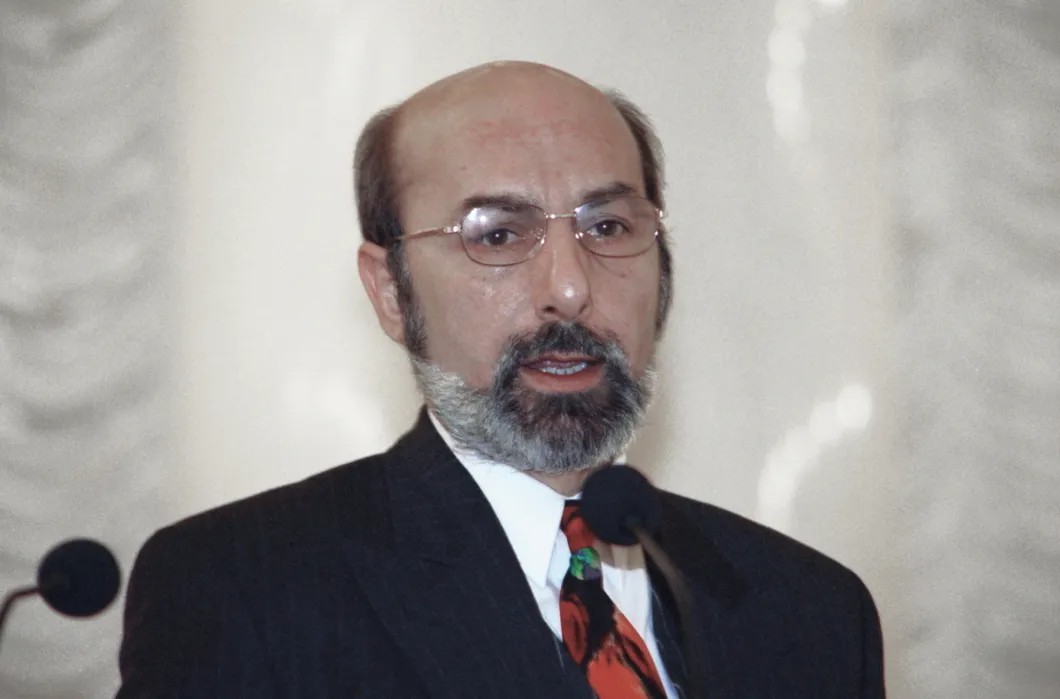
BACKSTORY. Novichok was first invented in the 1980s and had a slightly different composition from other nerve agents like Sarin gas. Some versions of Novichok, like the kind used against Sergei Skripal and his daughter in England two years ago, also have fluorine. You just need a small dose of Novichok, between 1 and 2 milligrams, for it to be lethal. And that's true of every version of the nerve agent. The US and Europe have imposed sanctions against Russia in response to various malign activities, including Russia's invasion of Ukraine, US election interference, human rights abuses, and the use of chemical weapons.
Read the full dispatch on the new EU sanctions from our correspondent in Brussels here, and our deep dive into the murder of Ivan Kivelidi here.
Crimea On The Edge of an Ecological Disaster, Explained
The Russian-annexed Crimea is on the edge of an environmental disaster. This week our Crimean correspondent Nadezhda Isayeva sends a dispatch about the worsening drought on the peninsula. Water reserves are drying up fast, and the region could run out of water supplies in just 81 days.
THE DISASTER IS NEARING, BUT OFFICIALS ARE SILENT.The main reservoirs in the region are currently under 15 percent capacity. Some have entirely dried up already. But local 0fficials in Crimea are not eager to discuss the emergency and reluctant to discuss rationing the water supply. Yet, some areas are already switched to partial access to running water.
THE CLIMATE CRISIS EXACERBATED BY TERRITORIAL STANDOFF. Persistent drought, which began in earnest over the summer, isn’t the only reason for the region’s water woes. The region has always relied on water supplies from the canals in southern Ukraine. Still, they’ve almost stopped following Russia’s annexation of Crimea in 2014. This year’s drought brings the region to the tipping point. First pipes with running water started drying up in the region’s capital Simferopol this August. Sevastopol, Crimea’s largest city, declared a water emergency this month.
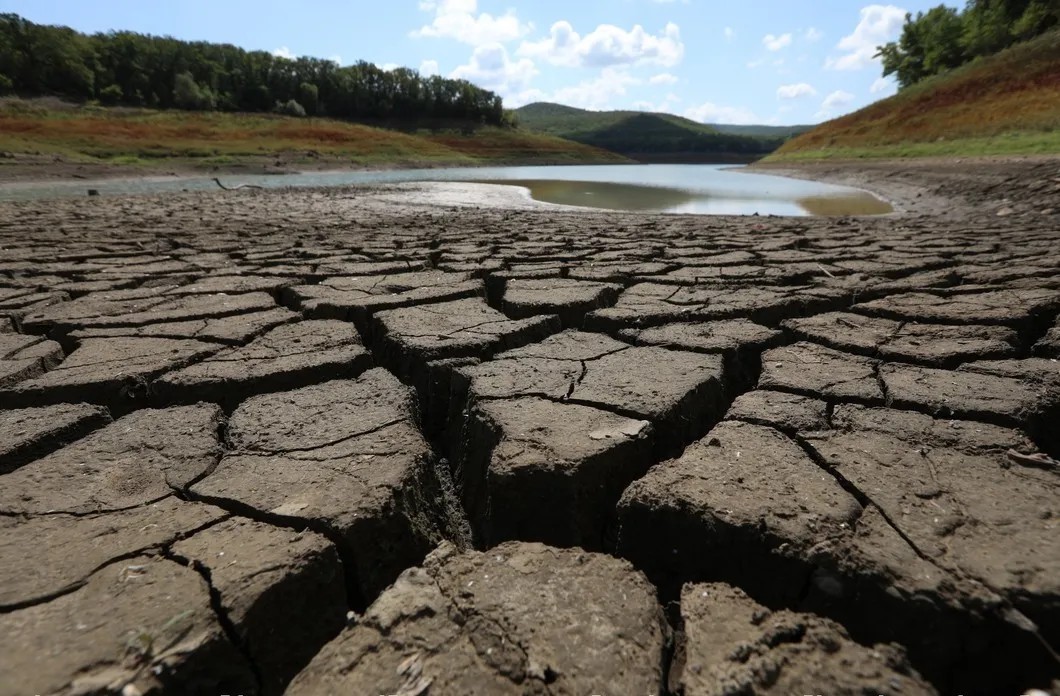
‘In some parts of the Republic of Crimea, the water scarcity is so serious that they had to introduce emergency measures,’ activist Alexander Talipov tells Novaya Gazeta. ‘Northern and central Crimea lack water, now the eastern part does too. The problem got worse over the summer after the military built a pipeline to transfer water from the Belogorsk reservoir to Simferopol.’
TIME AND LACK OF STRATEGY TRUMP THE RESPONSE. Officials are very concerned about the water crisis. Still, often their attempt to solve the problem involves asking for another billion in subsidies from the federal government, which is already investing a lot in the peninsula, Isaeva points out. Another plan by the local government is to drill more water wells. But it is only a short-term solution since many of the holes will eventually hit the saltwater horizon soon. Meanwhile, the construction of much-needed desalination plants is still just a vague plan. It might cost the region roughly $258 million.
Read our full report on Crimea’s pending water shortage here.
Other Top-Stories Russia Has Been Reading
- COVID-19 CRISIS IN NORILSK:After experiencing a catastrophic fuel spill this summer, the city of Norilsk in Russian Arctic is now hit with a second Covid-19 wave. Our dispatch from the city was one of the most read stories this week. It painted a bleak picture of how one of the largest mining hotspots in the country sends billions in profits to Moscow, yet receives back little in social and healthcare spending, which impedes the pandemic management. The Norilsk mayor tried to sound the alarm bells over the impending Covid-19 crisis, but he was fired soon after that. In August, an official from the local legislator released a video revealing that her son had died of Covid-19. She also spoke of a significant crisis looming and a city whose health services are already at a breaking point.
- ON THE GROUND FROM DONETSK: A series of dispatches from the Eastern Ukrainian frontline by our Ukrainian correspondent Olga Musafirova made it into our most-read stories this week. Musafirova tells the stories of folks surviving on the edge of war. Take Shyrokyne, a formerly large and wealthy village south of Donetsk — now divided by a frontline and abandoned. Only occasionally do locals come to check on their homes, or what is left of them, from afar. The former residents had to unite themselves in the struggle for their rights. They demand official permission to visit their native land and wish to receive compensation — either from Ukraine or from the self-proclaimed separatist official in Donetsk.
Thanks for reading!To keep up with Novaya Gazeta’s reporting throughout the week, you can follow us on Facebook, Twitter, Instagram, and Telegram. Our video content is available on Youtube and don’t forget to visit our website for the latest stories in Russian.
— The Novaya Gazeta Team
Поддержите
нашу работу!
Нажимая кнопку «Стать соучастником»,
я принимаю условия и подтверждаю свое гражданство РФ
Если у вас есть вопросы, пишите [email protected] или звоните:
+7 (929) 612-03-68
